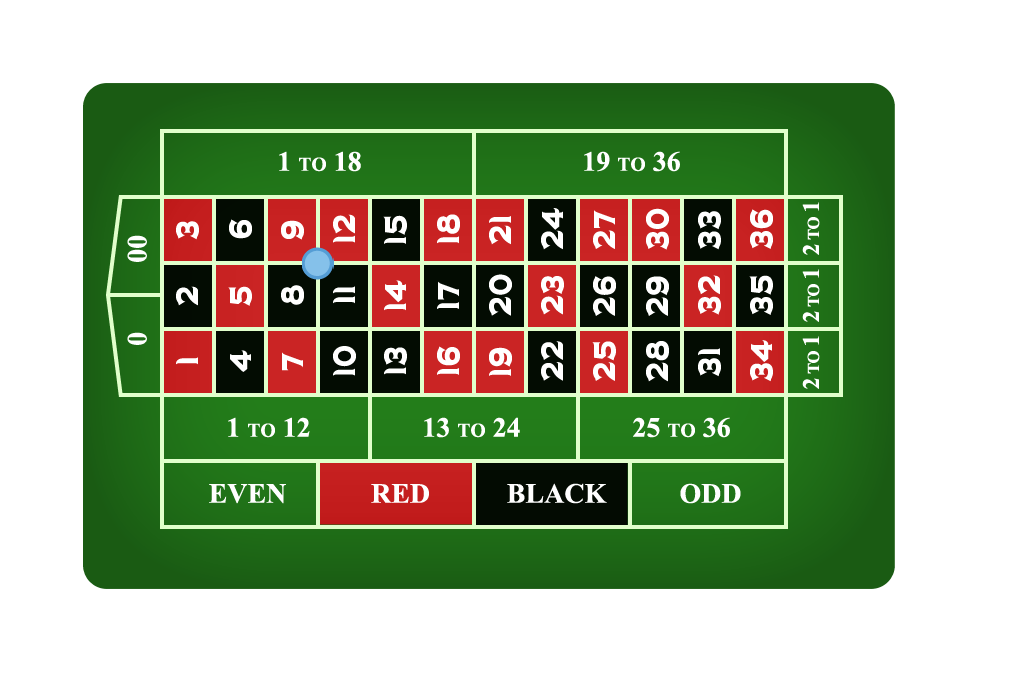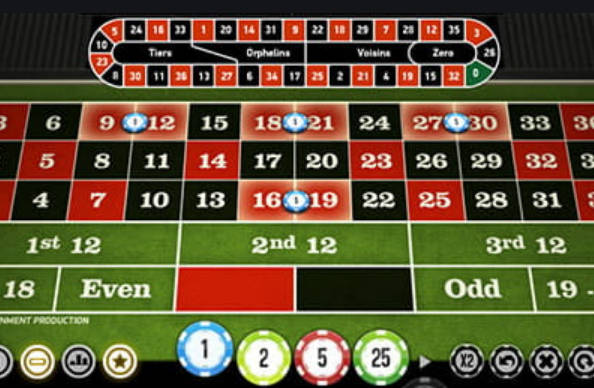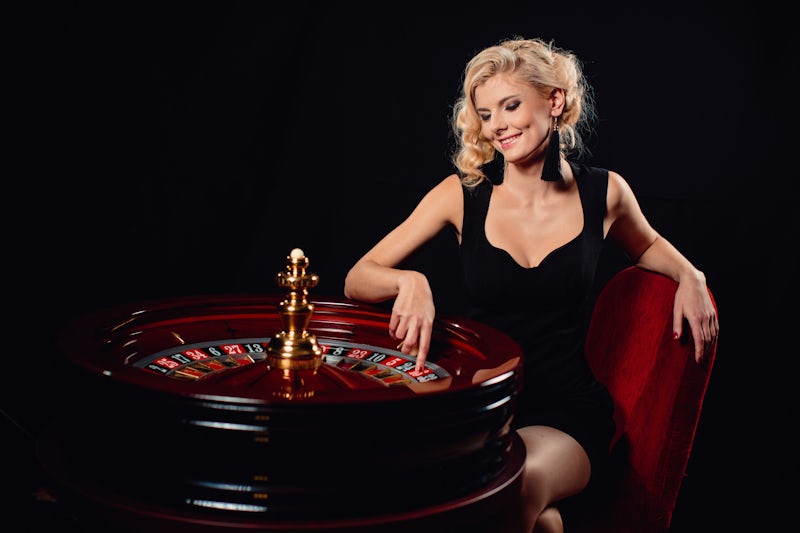Roulette Numbers To Bet On
Betting on negative roulette wheel numbers 'Negative betting' on the roulette table involves avoiding betting on numbers that have recently hit. This is a difficult strategy as you’ll need to quantify how cold a number is based on the frequency of other numbers. You’ll probably need a pen and paper for this one. Count of the Hottest Numbers in 300 Spins of Single-Zero Roulette. In 300 spins, the average number of wins on a single-zero wheel for any number is 300/37=8.11. The next table shows the probability of each count of the four coolest numbers in 300 spins of double-zero roulette. The American roulette wheel has 38 divisions including numbers from 1 to 36, 0 and 00. Numbers from 1 to 36 are alternately colored red and black, while the single zero and the double zero are marked in green. The main objective, which any player pursues, is to predict which numbered pocket the roulette ball is going to settle into.
For the most part, calculating roulette payouts is just a matter of multiplication. Each bet pays out at certain odds, and that determines what you multiply the bet by to get the payout. Also, as with most table games, the payouts are done on an X to Y basis, as opposed to an X for Y basis.
The 5-Number Bet – You can only bet on 0, 00, 1, 2, and 3 if you want to bet on five numbers, and it pays off at 6 to 1. This is the only bet on the roulette table with a different house edge from the other bets — 7.89% (the other bets have a house edge of 5.26%) Line – This is a bet on six numbers and pays off at 5 to 1. Don´t confuse this bet with a Four Number bet (which you can only play in European Roulette) by the way. They are very similar: they are both bets on 1,2,3 and zero(s) at the top of the table, but the odds on the 4 Number Bet are fine. If you are just making a bet on 5 numbers with straight up bets (5 chips on 5 numbers), then that is fine.
This post wants to cover roulette payouts in some degree of detail, though, including how much each bet pays off.
More importantly, I want to explain how the croupier is able to calculate payouts for roulette so quickly. Guess what? They have a system for that.
Payout Odds in Gambling
When you’re gambling on something, you get paid off using odds. Some games offer even odds, which means that if you bet $100, you win $100 when you win.
Most games, though, have various payouts for various kinds of bets.

The top jackpot on a video poker machine pays off at 800 for 1.
And that’s an important distinction. There’s a big difference between a payoff of 800 for 1 and a payoff of 800 to 1.
With table games like roulette, the payoffs are in the form of 2 to 1, 3 to 1, 35 to 1, etc.
This means that if you win the bet, you get to keep the amount you bet, and you get the winnings along with it.
If you bet $100 on a single number at the roulette table and win, you get a payoff of $3,500. But you also get to keep your $100.
With gambling machines, payouts are made on a “for” basis instead of a “to” basis. This means your winnings are traded for what you risked.
If you bet $5 on a slot machine and win a $10 payout, you don’t get your $5 back on top of that.
This is an important distinction you should make. Most gamblers don’t stick just with roulette, so if you’re going to play other games — and you probably will — you should understand how that works.
Specific Payouts in the Game of Roulette
In roulette, you have a huge variety of bets you can place. You bet on a single number. Or you can bet on two numbers — if either of those numbers come up, you win. Or you can bet on three numbers, and if any of those three numbers come up, you win.
The more likely it is for you to win, the lower the payout is.
A bet on black wins almost half the time. The payoff for that bet is only 1 to 1, or even money.

A bet on a single number pays off at 35 to 1, which is a big payoff, but it also only wins 1 out of every 38 spins on average.
The Difference Between the Odds of Winning and the Payout Odds
The casino makes its money from the difference between the odds of winning and the payout odds.
You know how you can express the payout on a bet as odds?
35 to 1 is an example of how you’d express a payoff on the single number bet.
The odds of winning can also be expressed in the same way.
On a standard American roulette wheel, you have 37 ways to lose a single number bet and only one way to win.
This means the odds of winning are 37 to 1.
Since the odds of winning are lower than the payoff for the bet, the casino makes a profit in the long run.
Once out of every 38 spins, they’ll pay off a single number bet, but they’ll only pay off 35 to 1 on that bet. The rest of the money goes into the casino’s pocket.
The casino deals in long-term averages, especially when it comes to roulette.
Roulette Bets and Their Payoffs
Here’s a list of bets you can make at the roulette table and how much each of them pays off.
The Outside Bets
These are the bets on the outside of the betting surface, and they’re the bets that pay off the most often. As a result, you win less with these bets.
Here are the outside bets you can make:
- Red(or Black) – You can bet on the color of the number, and the payout is even money — 1 to 1
- Even (or Odd) – You can bet that the number will be even or odd, and the payout is again even money — 1 to 1
- Low (or High) – You can bet that the number will be 1-18 (low) or 19-36 (high). The payout is even money on this one, too
- Columns – The numbers on the betting surface are organized into three columns. You can bet that the ball will land on one of the numbers in that column. The payoff, if you guess right, is 2 to 1
- Dozens – The numbers can be divided into 1st third (1-12), 2nd third (13-24), and 3rd third (25-36). If you guess right, you get a 2 to 1 payout
On all these outside bets, 0 and 00 count as losses. Those numbers are green, and they’re not considered even or odd, high or low.
The Inside Bets
These are the bets on the inside of the betting surface. They pay out better but have a bigger chance of losing.
Here are the inside bets you can make:
- Straight Up – This is a bet on a single number and pays off at 35 to 1
- Split – This is a bet on two numbers that are next to each other. It pays off at 17 to 1
- Street – This is a bet on three numbers, and it pays off at 11 to 1
- Corners – This is a bet on four numbers, and it pays off at 8 to 1
- The 5-Number Bet – You can only bet on 0, 00, 1, 2, and 3 if you want to bet on five numbers, and it pays off at 6 to 1. This is the only bet on the roulette table with a different house edge from the other bets — 7.89% (the other bets have a house edge of 5.26%)
- Line – This is a bet on six numbers and pays off at 5 to 1
All these bets would be a break-even proposition in the long run IF the wheel didn’t have a green 0 and a green 00.
How the Croupier Makes the Payouts So Quickly
The first thing the croupier does after the decision is to clear all the losing bets off the roulette table. Since he’s intimately familiar with the layout of the betting surface, this doesn’t take long at all.
Also, all the players at the roulette table have chips that are specifically colored so that they have the same color. You can’t use the roulette chips at the other table. This enables the croupier to tell your bet from someone else’s. It’s the color of the chips.

To calculate the payouts, you just multiply the bet by the payout odds.
If someone bet two chips on a single number and it won, you’d multiply 2 by 35 and get 70. That’s how many chips you’d give the player in winnings.
He doesn’t really have a magical system, either. He knows the payouts for the various bets, and he’s able to do the multiplication in his head. It’s easy multiplication, but even if it weren’t, he’d eventually just be able to memorize the correct payout relative to the number of chips bet.
Also, he doesn’t really think of the chips as money. They’re just betting units.
Can Any of This Information Help Me Win at Roulette?
Naw.
Roulette’s a negative expectation game.
You might get lucky in the short run, but if you play long enough, the math behind the payouts will eventually reduce your bankroll to 0.
Conclusion
And that’s how to calculate roulette payouts. You just memorize which bets are possible and how much they pay off. Once you know that, calculating the payouts is just a matter of multiplication.
Croupiers are able to do it quickly because they do it all day every day.
I’m able to make change in my head because I worked for years on cash registers that didn’t calculate change. I know how to subtract from 100 without any effort at all.
Calculating roulette payouts is a similar skill.
Please enable JavaScript to view the comments powered by Disqus.It’s no secret that people are a superstitious bunch. Detectives act on their “hunches”, students taking exams cross their fingers and knock on wood, and hotel owners skip from 12 straight to 14 in their floor plan. And in roulette, players favour some numbers over others. Is there any rhyme or reason to this, or is it simply what it sounds like: an old wives tale? Can humans really tap into something deeper when it comes to luck and probability, or are we really all stuck in a gradually overheating RNG machine?
A Brief History
The link between betting and probability has a long and intermingled history. In fact, gambling is the mother of probability. Blaise Pascal, who accidentally invented the roulette wheel in his attempt to construct a perpetual motion machine, struggled with the idea of probability from a mathematical standpoint. Through the contemplation of a notoriously difficult hypothetical gambling problem, he and Pierre de Fermat formulated the theory of probability. Before this time, there was no other “scientific” way for people to rationally predict outcomes to situations. They had to guess and trust their gut instinct. Since roulette and the theory of probability have grown together side by side, why is it that many people still adamantly hold onto their superstitious ways? Perhaps, sometimes there really is something that guides people to choose the way they do.
The Legend of 17
The number 17 is the number in the centre of the roulette board and is also famous for delivering some staggering wins.
Roulette Winning Numbers
- “Newcastle boss wins £1.3 million on lucky number 17”
- Sean Connery wins on 17 3 times in a row
If you ask croupiers what the most common number people bet on, the answer will always be 17. Not only does it lie in the centre of the board, making it the most obvious place to bet, MIT have described the number 17 as the “most random number”, meaning that when people choose a random number they go straight for 17. In several studies when correspondents were asked to choose a random number from 1 to 20, 17 was the most frequently chosen, making it the least random number by human standards. 7 followed closely behind. Computerised RNG made no such biases.
So, perhaps the phenomenal wins commonly associated with the number are simply because more people bet on 17. Ashley, a long time roulette player, most likely bet on the number 17 a lot of times before he hit his big break.
Sean Connery’s Staggering Win
Best Bet In Roulette
But, this doesn’t explain Sean Connery’s unbelievable achievement on the roulette wheel. Reportedly, while playing in Casino de la Vallee in Saint-Vincent, Italy, he placed 5 bets on the number 17. The first two he lost, but he persisted. The third time lucky, his number came up winning him 31:1 odds. Not content to settle with that, he placed all his winnings back on the number 17. Literally against all odds, the movie star wins again. Instead of walking away, Connery tempts fate and puts all his money on the 17 for a fifth and final time. The number comes up. Apparently the probability of hitting three single number bets in a row is 0.0000197% or 50,000:1. While it is weird that it would be the same number three times in a row, mathematically it’s like as likely as Connery guessing any other number correctly. Of course, that doesn’t make it any less bizarre.
Best Bet On Roulette Table
What on earth is going on here? Perhaps the number 17 truly is a mythical number for roulette.
Perhaps the reason is simply that Connery spotted a bias with the roulette wheel, and went with it. However, since the roulette wheel missed the mark the first two times, it still seems extremely risky. Maybe Connery was simply in the mood for a thrill! Or, perhaps he slipped the croupier a little something under the table… Sadly, we will never really know the answer to the mystery of the number 17. We can see why people love betting on it though!
Other Common Lucky Numbers
The number 7 is perhaps the most common number that people like to bet on, after 17, because it is generally considered to be lucky. People also love the number 3, as everyone knows all good things come in threes. However, these numbers are all lucky in the Western culture. Eastern casinos would tell an entirely different story of what the most common numbers bet on are. For instance, the number two has extremely positive associations in Asian casinos: double your luck and double your chances!
Least Favourite Numbers To Bet On
As we already mentioned, people tend to avoid the number 13. Its unluckiness is well established throughout most of Western culture. However, in Italy the number 13 is lucky and the number 17 unlucky. So, if you are betting with an Italian you can expect them to do the reverse of what you might expect. Players universally tend to dislike betting on the zeros, perhaps because of the placement on the board, and perhaps because of their unlucky associations with the house edge.
Conclusion
17 is a very common number to bet on, which is most likely why you hear so many great success stories surrounding it. 7 is also very common and has enjoyed fame because of a number of big wins associated with it. The more fame these number have, the more likely people are to bet in them – thus increasing their fame and luck further.
Whatever number you bet on mathematically has the same chance of coming up. So if you do have a favourite number spread that means a lot to you, like a birthday or anniversary date, there’s no reason why you shouldn’t use it. They are just as likely, or rather unlikely, to come up as any other. Then, when your numbers do come up you’ll have all the more reason to favour them! Keep this in mind when playing online for real money.